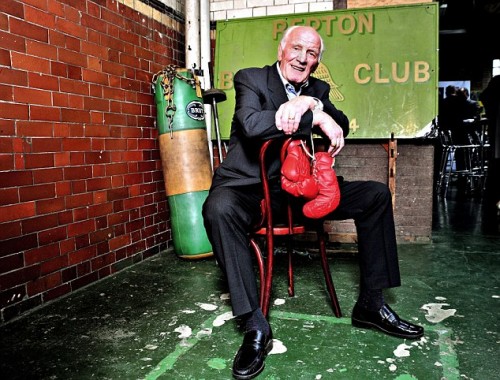NORMAN GILLER pays tribute to Sir Henry Cooper, a champion and a friend for 50 years, and always a friend of sports journalists
Sportswriters lost one of their best friends yesterday with the passing of Sir Henry Cooper, a boxing master and a man among men.
In all the 50 years that I knew and loved – yes, loved – him, I never once knew Henry turn away an interview from any journalist. He was as open as a book, and he gave a lead to all sportsmen how to conduct themselves with the press and the public. He always acted with dignity and sportsmanship, and could teach the millionaire sportstars of this modern world a thing or three about how to behave in and out of the sports arena.
I can pinpoint exactly when I became pals with Henry. He was training for his first British title fight against Brian London in 1959 and I accompanied him on one of his 6am training runs for a feature I was writing for the fight game tradepaper, Boxing News.
In those days I was as skinny as a pipe cleaner and when I stripped off to get into a tracksuit Henry’s Cockney-as-they-come manager Jim “The Bishop” Wicks said, “Blimey, I’ve got greyhounds fatter than you. You need a good meal rather than a good run.”
Henry came to my defence: “Don’t listen to him, Norm. You can’t fatten thoroughbreds.”
From that day on it was a catchphrase between the two of us as our working relationship blossomed into strong friendship. I always ribbed him that I had known his wife Albina longer than him. She used to serve my wife and I our meals when a waitress in her uncle’s famous Soho restaurant, Mario’s, which is where Henry met her before their long, idyllic marriage.

I could fill a book with Henry anecdotes. Come to think of it, we did write three books together – Henry Cooper’s 100 Greatest Boxers, Henry Cooper’s Greatest Fights and How To Box.
The closest we came to falling out was when I became Frank Bruno’s publicist in the 1980s. I was the orchestrator of many of Frank’s often cringy one-liners, and Henry once accused me of “putting the words into the mouth of a dummy”.
Henry never rated Frank, and had an even lower opinion of Joe Bugner, to whom he was adjudged to have been outpointed in his last fight. To his dying day, Henry was convinced he had been the victim of a robbery and was outspoken against referee Harry Gibbs to the extent that the legal eagles were called in because of “fix” allegations.
There was a naturalness and modesty about Our ‘Enery that won him affection throughout the nation, and his fame transcended the boxing world in which he earned only moderate money.
It was only after his retirement from the ring that he began to accumulate wealth thanks to commercial contracts (particularly the long-running Brut “Splash it all over” campaign’) as he almost apologetically cashed in on his huge popularity.
When a syndicate on Lloyd’s collapsed in the early 1990s, it wiped out much of Henry’s fortune. He took it on the chin and reluctantly auctioned off his record three Lonsdale Belts. “I wanted to pass them on to my grandchildren,” he told me, “but we’ve got to eat. Those belts literally cost me blood, sweat and tears.”
For the record: Henry was ABA light-heavyweight champion before winning 40 of his 55 professional contests, 27 by knock out, one drawn, in a 17-year career from 1954 to 1971.
He was a notorious “bleeder”, seven of his defeats were a direct result of cut eyes. He won three Lonsdale Belts outright; held European and Commonwealth or Empire titles, the British crown for 11 years. He had his last fight against Joe Bugner at Wembley on March 16, 1971, and few agreed with the Harry Gibbs verdict that Bugner had won on points.
Both Henry and I lost our adored wives within the same period. Albina and my Eileen were good friends and our reunions since their passing were always tearful.
Soon after losing Albina, Henry’s identical twin brother George (who boxed as Jim Cooper) died. The huge double blow knocked the spirit out of Henry, and we among his closest friends were concerned about his health for the last several months.
He will always, of course, be associated with the two fights with Muhammad Ali, particularly the first when he knocked down the then brash, flash Cassius Clay in the last seconds of the fourth round with his feared and famed left hook.
“Life’s all about timing,” he said to me in a philosophical moment years later. “If I had caught Ali with my ‘ammer in the first minute of the round instead of the last there is no question I would have knocked him out. That would have changed my life for ever.”
But we didn’t want Henry to change. He was one of the loveliest blokes to cross my path and I feel privileged to have known him. Rudyard Kipling could have had no better example for treating the imposters of triumph and disaster the same. And he truly was a man, my son.
Henry – Our Enery – will always be held up as a beacon as to how champions should behave in public and in private.
Rest easy my wonderful old friend. You can’t fatten thoroughbreds.